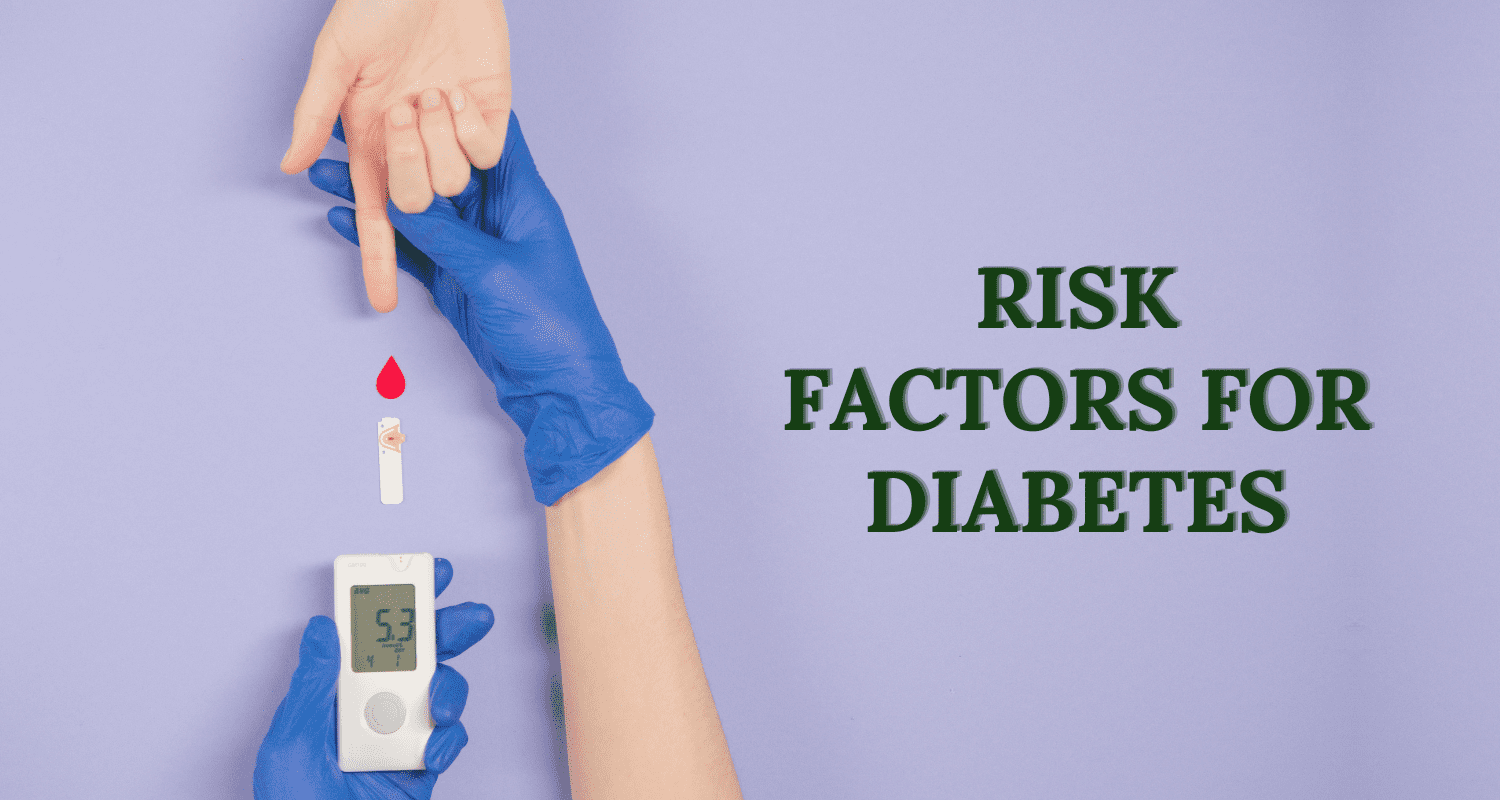In the U.S., many have prediabetes, with about 97.6 million adults 18-64 and 27.2 million 65 or older affected. This includes those with Type 1 and Type 2 diabetes who might not know. This puts them in danger of serious health issues.
Type 2 diabetes may come from your family or your background. Age and even past gestational diabetes can contribute. But, there are also things you can change to lower your chances.
In this article, we’ll explore what can cause diabetes, both modifiable and non-modifiable factors with symptoms and prevention for optimal wellness.
Let’s delve into what can cause diabetes.
Key Takeaways:
- Risk factors for Type 2 diabetes include family history, race or ethnic background, age, and a history of gestational diabetes.
- Modifiable risk factors for Type 2 diabetes include weight, physical activity, blood pressure, and smoking.
- Understanding what can cause diabetes and risk factors is essential for prevention and management.
- Adopting a healthy lifestyle, including maintaining a balanced weight, engaging in regular physical activity, and managing other health conditions, can significantly reduce the risk of developing diabetes.
- Consulting with a healthcare professional is necessary for personalized guidance and support in preventing and managing diabetes.
Non-modifiable Risk Factors for Type 2 Diabetes
Some risk factors for Type 2 diabetes can be adjusted to lower the chances of getting it. However, there are also factors we can’t change. These play a big part in knowing how likely we are to get the disease.
Family history is a major non-modifiable risk for Type 2 diabetes. If your parents or siblings have it, you might be at risk. Knowing and acting on your family’s health history is crucial.
The race or ethnic background of a person can also affect their risk. Some groups like Black, Asian, and Latino/Hispanic Americans have a higher diabetes risk. This might be from genetic and lifestyle differences.
Age is another key factor. The older we get, the more likely we are to get Type 2 diabetes. This is because our bodies can struggle to control blood sugar over time. It’s important to have regular health checks, especially as we age.
Having gestational diabetes during pregnancy can also raise the risk. Women who have it should stay cautious about their health. Preventing diabetes is important for them later in life.
Non-modifiable Risk Factors for Type 2 Diabetes:
- Family history
- Race or ethnic background
- Age
- Gestational diabetes
Even though some Type 2 diabetes risks can’t be changed, knowing about them is critical. By being aware, people can take steps to prevent or manage the condition. This includes healthy lifestyle choices and regular medical check-ups. Prevention is key for a long and healthy life.
Modifiable Risk Factors for Type 2 Diabetes
When talking about Type 2 diabetes, we can change certain risk factors by changing how we live. This means we can lower the chance of getting diabetes and get healthier overall.
Weight
Being overweight is a big risk factor for Type 2 diabetes. But, just losing a bit of weight can help a lot. Studies show that dropping 5% to 10% of your body weight can cut the risk of diabetes a lot.
Physical Activity
Regular exercise is key in lowering the risk of Type 2 diabetes. It makes your body use insulin better. So, by doing things like walking, running, or biking, you can cut your diabetes risk. This also helps lower the chance of heart problems, which are common for those with diabetes.
Blood Pressure
Keeping your blood pressure in check is crucial for preventing diabetes. High blood pressure can lead to heart and kidney problems. But, with a good diet and regular exercise, you can lower this risk and live healthier.
Smoking
Smoking is really bad for your health and raises the risk of diabetes. It messes with how your body handles insulin and blood sugar. Quitting smoking doesn’t just lower your diabetes risk. It also cuts your risk of other diseases, like lung cancer and heart issues.
To avoid Type 2 diabetes, it’s important to focus on your lifestyle. This means exercising often, keeping your weight in a healthy range, managing your blood pressure, and not smoking. These steps can really lower your diabetes risk and help you feel better.
Understanding Type 2 Diabetes
Type 2 diabetes happens when the body struggles with insulin. Insulin is a hormone that lowers your blood sugar. When it doesn’t work right, blood sugar can get too high, causing problems.
Insulin lets your body’s cells use sugar as energy. But, for some with type 2 diabetes, there’s not enough insulin. Or, the insulin doesn’t help the cells use sugar properly.
When your body’s cells ignore insulin, it’s called insulin resistance. This leads to too much sugar in your blood, making it hard for your body to work right. Eventually, this can cause high blood sugar.
The pancreas makes insulin, but with type 2 diabetes, it might not make enough. Over time, this can get worse because the pancreas works less well.
Spotting type 2 diabetes early is key. Symptoms to watch for include being very thirsty, going to the bathroom a lot, feeling more hungry, tiredness, not being able to see well, and sores that heal slowly.
Some people might not show many symptoms. This makes it tricky without regular check-ups.
Risk Factors for Type 2 Diabetes:
- Family history of diabetes
- Obesity or overweight
- Sedentary lifestyle
- High blood pressure
- High cholesterol levels
- Ethnicity (particularly African American, Hispanic/Latino, Native American, Asian American, or Pacific Islander)
- Age (45 years or older)
Though type 2 diabetes is not curable, it’s manageable. This can involve changes in your daily habits, eating well, moving often, and sometimes taking medicine.
When caught early, you can keep this condition from causing more harm. Taking charge early on can make a big difference in how well you live with diabetes.
Other Factors that Can Cause Diabetes
Both non-modifiable and modifiable risk factors are key in diabetes development. Yet, there are more causes of this long-lasting health condition.
Genetic Mutations
Genetic changes can bring on different diabetes types. Monogenic diabetes, for instance, comes from special genetic issues affecting insulin. Also, diseases like cystic fibrosis and hemochromatosis can up the diabetes risk, too.
Hormonal Diseases
Conditions like Cushing’s and hyperthyroidism can make the body resist insulin. This can lead to diabetes. They mess with the body’s normal hormone distribution, affecting insulin and glucose use.
Pancreatic Damage
The pancreas makes insulin which is vital for diabetes management. If it’s hurt, like in pancreatitis, or removed by surgery, insulin-making can slow. This can start diabetes.
Medications
Then, there’s a link between diabetes and some drugs. Niacin, diuretics, and certain mental health meds can harm insulin use. Always talk to your doctor to know about any medication risks.
Knowing these extra diabetes causes is crucial. It helps spot potential triggers and risks. This way, people can do things to stay healthy and cut down their diabetes chances.
Complications Related to Diabetes
Diabetes affects major organs like the heart, blood vessels, nerves, eyes, and kidneys. These problems can hurt health and quality of life. It’s key to manage diabetes well to avoid or lessen these risks.
Heart Disease and Stroke
People with diabetes face a bigger chance of heart disease and stroke. High sugar levels can hurt blood vessels and up the plaque risk. This makes arteries narrow or clog, which harms blood flow to the heart or brain, upping heart attack or stroke odds.
Nerve Damage
Diabetes might cause nerve damage, or diabetic neuropathy, which affects body parts. Symptoms might be numbness, tingling, or pain in the hands, legs, or feet. It can also lead to digestive, bladder, or sexual issues.
Kidney Disease
Diabetic kidney disease, or diabetic nephropathy, is a common issue. High sugar levels can damage kidney blood vessels’ filters. This harms waste removal, possibly leading to kidney failure, dialysis, or the need for a transplant.
Eye Damage
Diabetes can also mar the eye’s blood vessels, causing diabetic retinopathy. This can lead to vision woes, like blurry vision, color problems, or sometimes blindness. To catch and treat this early, regular eye checks are a must.
Other Complications
Besides the major issues, diabetes can cause more health troubles. This includes skin problems, slow wound healing, hearing loss, sleep apnea, and higher dementia risk. Managing diabetes well and visiting healthcare teams often can help prevent these.
Prevention of Type 2 Diabetes
Preventing type 2 diabetes is key to living healthily. This means eating the right food, staying active, and managing your weight. By doing this, you decrease the possibility of getting the disease.
Eating a Balanced and Nutritious Diet
A big part of stopping diabetes is what you eat. Choose foods like fruits, veggies, whole grains, lean meats, and good fats. Also, avoid sugary drinks, processed meals, and bad fats.
Engaging in Regular Physical Activity
Moving often helps keep diabetes away. Aim for activities like walking fast, biking, or swimming. Also, work out your muscles two times a week.
Maintaining a Healthy Weight
Staying at a healthy weight is vital for diabetes prevention. If you’re too heavy, especially around your waist, you’re more likely to get sick. Eating well and working out can help you lose a bit of your weight, which really lowers your risk.
Avoiding Long Periods of Inactivity
Sitting around too much can make diabetes more likely. Try not to sit more often. Do things like standing while on the phone to move more during the day.
Lifestyle Changes for Individuals with Prediabetes
If you have prediabetes, making lifestyle changes can stop you from getting fully sick. Changing how you eat and move can really help. Getting help from a doctor makes these changes even more effective.
Medications for High-Risk Individuals
Some people might need medicines to lower their diabetes risk. These medicines can help, but staying healthy in what you eat and how you move is still very important. Always listen to what your doctor says.
Causes of Type 1 Diabetes
Type 1 diabetes is a long-term issue. It happens when the immune system attacks the pancreas’s insulin-making cells. This attack stops insulin production, leading to high blood sugar. Though the exact reason for type 1 diabetes is a mystery, we know genes and the environment are involved.
If someone in your family has type 1 diabetes, you might be at risk. Certain genes can make you more likely to get the disease. But, having these genes does not always mean you will get diabetes. These genes might just make some people more open to the immune attack that harms insulin cells.
External factors like certain viruses and early diet might also spur type 1 diabetes. For example, being exposed to viruses like enteroviruses raises the risk.
Some studies suggest that infants who start drinking cow’s milk too early or lack vitamin D may have a higher chance. These outside elements, combined with genetic makeup, could kick off the immune reaction that harms insulin cells.
Factors contributing to the development of type 1 diabetes include:
- Genetic predisposition: Having certain genes linked to type 1 diabetes can raise the risk.
- Family history: If type 1 diabetes runs in your family, you might end up with it.
- Environmental triggers: Early viral infections and certain foods as a baby can spark this disease.
Knowing the causes is vital to prevent and handle type 1 diabetes. Right now, we can’t stop it from happening. However, scientists are looking for ways to stop or slow its start in those genetically prone. Finding it early and managing it well can help lower the risks and avoid severe complications.
Causes of Type 2 and Gestational Diabetes
Type 2 and gestational diabetes are different but both involve insulin resistance. Let’s look at what can cause diabetes.
Type 2 Diabetes Causes
Problems like obesity and lack of exercise often lead to type 2 diabetes. Extra weight, usually around the belly, can cause insulin resistance. This means the body’s cells don’t use insulin well, making blood sugar levels rise.
This can make the pancreas overwork to produce more insulin. Eventually, people may get type 2 diabetes.
Genes can also make some people more likely to get type 2 diabetes. But remember, choices about health and lifestyle are a big factor too.
Gestational Diabetes Causes
During pregnancy, gestational diabetes can happen because of hormonal changes. These hormones from the placenta can block insulin, causing insulin resistance.
Family history, being overweight, and not moving much increase the risk of gestational diabetes. Eating unhealthy foods also plays a part.
It’s key to treat gestational diabetes well to avoid problems during pregnancy. It also lowers the chance of getting type 2 diabetes later on.
Type 2 and gestational diabetes involve insulin resistance. But, their causes are not the same. While lifestyle and genetic factors are big in type 2 diabetes, gestational diabetes is more about hormonal shifts in pregnancy, alongside genetic and lifestyle factors.
Conclusion
Knowing the risk factors, causes and symptoms of diabetes can help prevent and control the disease. By choosing a healthy lifestyle, you greatly lower the risk of getting diabetes. This includes staying at a healthy weight, keeping physically active, and handling other health issues well.
It’s important to talk to a doctor or nurse for advice on what can cause diabetes that fits you personally. They offer tips to stop the risk factors of diabetes, assess your risks and symptoms, and suggest lifestyle changes just for you. With the right choices and proactive actions, avoiding diabetes is within reach.
In what can cause diabetes? The key is in our hands to dodge diabetes. With a healthy lifestyle and thoughtful decisions, we can lower the chances of facing this health issue. Let’s focus on staying healthy and making avoiding diabetes a key goal.
FAQs
What can cause diabetes?
Diabetes can be caused by genetic factors, an inactive lifestyle, obesity, and poor dietary choices.
What was the main cause of diabetes?
The main cause of diabetes is often a combination of genetic predisposition and lifestyle factors such as diet and physical activity.
What foods cause diabetes?
Foods high in refined sugars and unhealthy fats can contribute to the development of diabetes.
Can eating too much sugar cause diabetes?
Yes, consistently consuming excessive sugar can increase the risk of developing type 2 diabetes.
Can you develop diabetes?
Yes, anyone can develop diabetes, especially if they have risk factors such as obesity, a sedentary lifestyle, or a family history.
Can stress cause diabetes?
Chronic stress can contribute to the development of diabetes by increasing blood sugar levels and promoting unhealthy behaviors.
How can you prevent diabetes?
You can prevent diabetes by maintaining a healthy weight, eating a balanced diet, exercising regularly, and avoiding excessive sugar and processed foods.
Disclaimer: This content, including advice, provides generic information only. It is not a substitute for a qualified medical opinion. Always consult a specialist or your doctor for more information. Nutrition Cult does not claim responsibility for this information.




